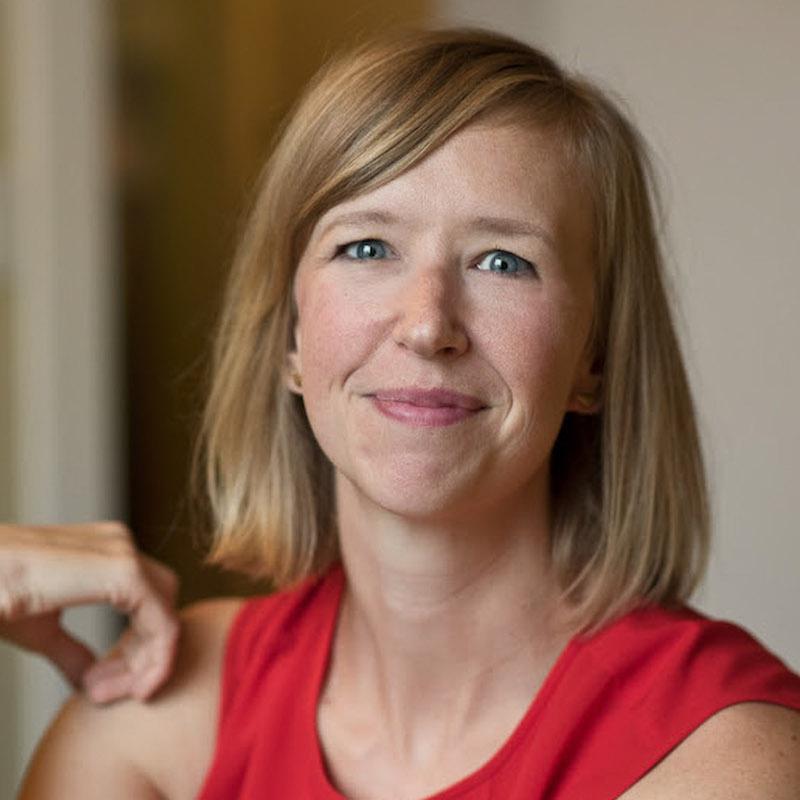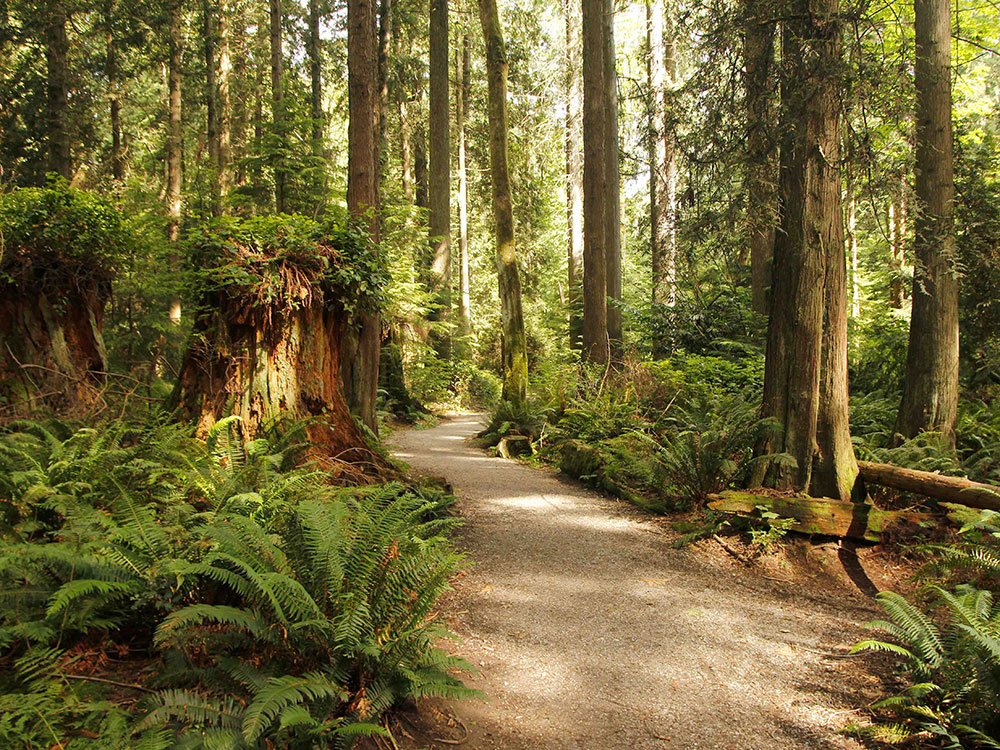We had been home from the hospital for a full two weeks before I managed to get one of my newborn twins into the baby sling and out of the apartment for a walk. Not even the simplest things felt simple at that point.
The tasks required to keep us all alive — eating, pumping, grocery shopping, changing diapers — were swallowing me whole. Strapping a baby to my chest and walking out into the cool evening air felt like surfacing from a long dive in murky water.
I walked two blocks to the edge of Pacific Spirit Park. “This is a cedar tree,” I said to the six-pound person zipped into my jacket. “You can tell by the bark. And this one is a big leaf maple. See? The world is way bigger than our living room.”
I looked down only to discover that he was already asleep. But I continued our tour anyway, naming the plants I knew, describing the clouds and the crows and the long, dusky light and the mycelial network just out of sight beneath my feet. I hoped he could feel my love for this place, even as he slept — and that, in time, he and his brother would come to love it too.
Once the babies and I mastered the art of leaving the house, I put them in the stroller and we headed to the forest every afternoon. For months, it was the only way they would take their last nap of the day. When they got big enough to stay awake, they began reaching out for the branches as we passed. I wheeled them to the edge of the trail where they could touch the trunk of a giant hemlock.
“Bark,” I said, eager to name the world for them.
“Ruff Ruff!” they replied. I laughed.
We wandered together every day, always taking a slightly different route. I picked thimbleberries and popped them into their tiny, waiting mouths. Whenever we heard a woodpecker, we stopped to see if we could spot him. I learned the difference between the sword fern and the spreading wood fern, the trailing blackberry and the invasive Himalayan blackberry. Walking among the massive cedars and hemlocks and firs, I could feel my mind come into focus. I could, for a moment, shake off the haze of a sleepless night.
When they started walking and talking a few months ago, my kids became demanding. “Get out! Get out!” they shouted the moment I rolled the stroller off the pavement and onto the trail. I hoped they would love the forest but I never fully imagined what that love might look like.
Maybe I pictured us cruising the trails together, stopping to inspect a spider web. But my kids rarely cruise. They climb and dig. They clamber onto massive mossy logs and shout “Mama help!” when they don’t know how to get down. They bushwhack through salal to the nearest stand of huckleberries and shove the ripest ones straight into their mouths. They excavate the rich red mulch at the base of a decaying cedar stump until I drag them home with promises of crackers.
If my love of the forest is serene and intellectual, theirs is full-body. It is buoyant and unrestrained.
At two, they are no longer babies, but small humans who are resolute in the delight they take in the world. It’s such a pleasure to witness. When I first thought seriously about becoming a parent, this vicarious delight was one of the things I felt excited about. I loved seeing my dog finally get brave enough to go on his first swim, relishing the cool water on a hot day. I imagined that watching my kids discover the world would feel the same, only amplified. In many ways, this has been true. But lately, in the forest, the shadows of worry and grief flicker across my view.
The thing about having twins is that, for the first couple of years, the intense labour of keeping them both fed and rested crowds out nearly everything else. Only recently have I been able to lift my head and take a look around. What I see is hard to reconcile: this land is beautiful and they take such obvious joy in it. And this land is burning.
It’s not like I haven’t thought about the stakes of having kids in this era of accelerating climate change. I thought about it during my pregnancy, when the heat dome struck and the thermostat in the living room reached 37 degrees and I could walk only a few feet before stopping to rest.
I thought about it in the months after they were born when one atmospheric river after another raged overhead, washing out the trails and loosening the tree roots. I thought about it on their first birthday, the smokiest day of the year, when I wondered how many outdoor parties we would have to reschedule in the years ahead.
But it was still possible to push those thoughts aside, simply because the endless tasks of daily life demanded it.
But this summer, as I watched forest fires ravage the province, I began to wonder what it meant to teach my children to love something so precarious. According to the latest update, wildfires have burned over 2.47 million hectares of land in B.C. since April. A group of scientists have declared B.C. “a hotspot for catastrophic wildfire losses,” predicting more record-breaking forest fire years ahead. And the more carbon our burning forests release into the atmosphere, the hotter and drier our summers become, creating the conditions for longer, more intense fire seasons ahead.
I want the joy that I take in my kids’ joy to be pure and uninflected. But maybe being a parent always means living with the possibility of loss. Maybe that’s what it means to be human. My family lives on land that was stolen from the Musqueam people only a few generations ago. As an immigrant and a descendant of European settlers, I’m well aware that my relationship with this place has never been uncomplicated, and neither is my children’s.
This is not the first apocalyptic moment to arrive in these forests. I know, too, that the changing climate is driving people from their homes already, that we are lucky and privileged to live without the fear of immediate displacement.
I had a very complicated, high-risk pregnancy. And for the first two weeks after my kids were born, I could not stop thinking about how improbable their safe arrival had been. Everything still felt so tenuous. I woke up in a sweat from devastating dreams in which I learned I had only imagined my pregnancy and birth and there were no babies.
But when I was awake, I was often struck with a sense of euphoria that seemed to wash over me out of nowhere. Maybe it was the delirious combination of sleep deprivation and postpartum hormones, but I felt, with a conviction I’ve never known before or since, that I understood the point of life, which was to love each other.
And what a miracle it was that any of us actually got to do that. What a miracle it was that my partner and I got to love these tiny, needy people. “Can you believe we made them?” he would say to me at 3 a.m. while they finally slept and I hooked up the breast pump and he fixed us both a bowl of cereal.
I am trying to summon that feeling again now, as I think about the years and decades to come, to remember that maybe love is the point. Scientist and writer Robin Wall Kimmerer says, “we have to put our hands in the earth.” That’s how we express love for this wounded world. “Even a wounded world is feeding us,” she writes. “Even a wounded world holds us, giving us moments of wonder and joy.” As I read and reread this line, I think of my kids, and how easily this version of love comes to them.
They already understand that they aren’t separate from the ecosystem but part of it. I don’t know when or how I’ll start talking to my kids about wildfires, but I know it’s coming. They’re paying attention, questions are inevitable. Until then, I am going to try to settle into my discomfort — with the dirt they trail through the apartment and the grief that lays ahead for all of us. Despite everything, I am glad to be reminded that there is still so much joy to be had here on this singular, wounded, beautiful planet.
Poet Ross Gay says that joy is “a practice of survival.” And when I think about the future, it is my kids’ stubborn commitment to joy that propels me toward it. I know that loving the world is not enough to heal it, but it is an entry point. If I can’t shield my children from the grief of climate change and the threat of ecological collapse, I can at least step back and let them put their hands in the earth. I can make space for all our joy. ![]()
Read more: Health, Environment

















Tyee Commenting Guidelines
Comments that violate guidelines risk being deleted, and violations may result in a temporary or permanent user ban. Maintain the spirit of good conversation to stay in the discussion and be patient with moderators. Comments are reviewed regularly but not in real time.
Do:
Do not: